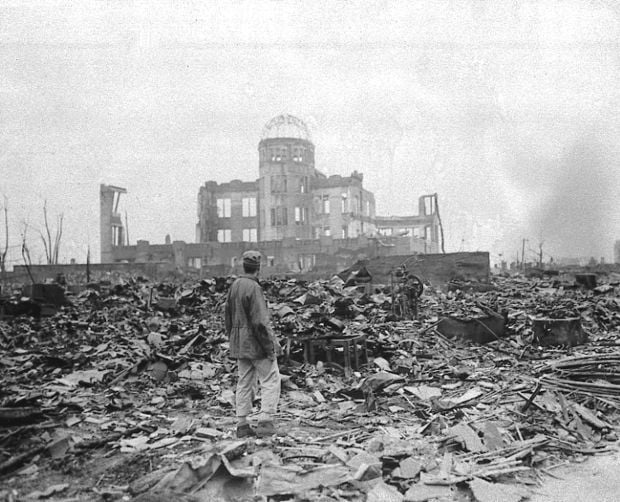The following column is the opinion and analysis of the writer:
Seventy-five years ago on Aug. 6 and 9, 1945, the United States launched humanity into the nuclear age with the atomic bombings of Hiroshima and Nagasaki, Japan. More than 200,000 people were dead within days, half of them killed in an instant as the flash and blast flattened their cities. Hundreds of thousands more were maimed by the bomb or sickened by the “black rain” of radioactive fallout. Birth defects, leukemia and other cancers, chronic disease and the many long lasting effects of radiation exposure are still being felt today.
We somberly remember those who have died and suffered as a result of nuclear weapons, nuclear power and nuclear testing since 1945, including atomic veterans, downwinders, uranium miners and nuclear industry workers. We join with the hibakusha, survivors of the atomic bombings in Japan, who say “Never Again!” must these weapons be threatened or used.
Today, a generation after celebrated treaties cut the number of ready-to-use nuclear weapons in the world, discouraged their proliferation, slowed their future development and promised the pursuit of “general and complete disarmament” (the 1970 nuclear nonproliferation treaty), most of these objectives have now been abandoned. A new nuclear arms race again threatens all life.
The United States’ multitrillion-dollar commitment to rebuild its entire arsenal of nuclear weapons and the submarines, airplanes and missiles that deliver them began under President Barack Obama, only to be accelerated under President Trump. And the newest missile in the United States’ expanding nuclear arsenal? It’s being made right here, in Tucson.
Last April, the Pentagon named Raytheon Missiles and Defense in Tucson as the sole-source contractor for a multibillion-dollar program to develop and produce the new long-range stand-off cruise missile to launch nuclear warheads from under the wings of warplanes. Today, Raytheon employees in Tucson are designing and engineering production of the missile. In the coming years, more will help to assemble, test and deliver hundreds of them to the Air Force, which will install the nuclear warheads.
We say, “Not in our names!” And we ask, how is our security as a nation and our humanity as a people advanced by this renewed investment in the original weapons of mass destruction?
We do not oppose those working at Raytheon. We understand the need for good paying jobs in Tucson. What we oppose is the militarism that exploits this need, promising to “develop” our own community at the expense of potentially destroying others around the world.
One year ago on Hiroshima Day, Aug. 6, the Tucson City Council passed resolution #23064, expressing the mayor and council’s support for the Treaty on the Prohibition of Nuclear Weapons, or TPNW.
This historic nuclear ban treaty was drafted after a series of international meetings to review the humanitarian consequences of nuclear war. Delegates learned from experts how health-care systems, food production, political institutions and entire economies would be upended, overwhelmed or simply destroyed in the aftermath of even a “limited” nuclear war. The pulverized cities and ensuing firestorms would lift massive amounts of smoke and ash into the stratosphere, triggering a “nuclear winter” with apocalyptic consequences. They concluded that for humanity’s survival, a nuclear war must not be fought and can never be won.
The TPNW was adopted by the United Nations General Assembly on July 7, 2017, on a vote of 122 to 1. The nine nuclear powers — the United States, United Kingdom, Russia, France, China, India, Pakistan, Israel and North Korea — and their close allies skipped the meetings and the vote.
The nuclear ban treaty lists prohibited nuclear weapon-related activities, making any such activity — i.e. to develop, test, produce, acquire, possess, stockpile, use or threaten to use nuclear weapons — a violation of international law. Significantly, it closes the legal gap that opened the way to a new nuclear arms race. Human progress in the 20th century was marked by international treaties that outlawed the possession and use of such other indiscriminate weapons as poisonous gas, biological toxins and cluster munitions. None have outlawed nuclear weapons by name — until now. The nuclear ban treaty will enter into force as international law when formally ratified by 50 nations. At this date, 40 have already done so.
There are still nearly 14,000 nuclear weapons, with the U.S. and Russia each having more than 6,000. Most are many times more powerful than the nuclear weapon dropped on Hiroshima. A single one could destroy a city and kill most of its inhabitants.
Please join us in supporting the Treaty on the Prohibition of Nuclear Weapons, which provides a path toward nuclear abolition and away from the existential threat of nuclear war (more information at www.icanw.org). Its adoption will free up more of the money and minds needed to address other global threats, including poverty, racism, the climate crisis and COVID-19 pandemic. Our survival demands better ideas to improve lives, not better weapons to destroy them.





